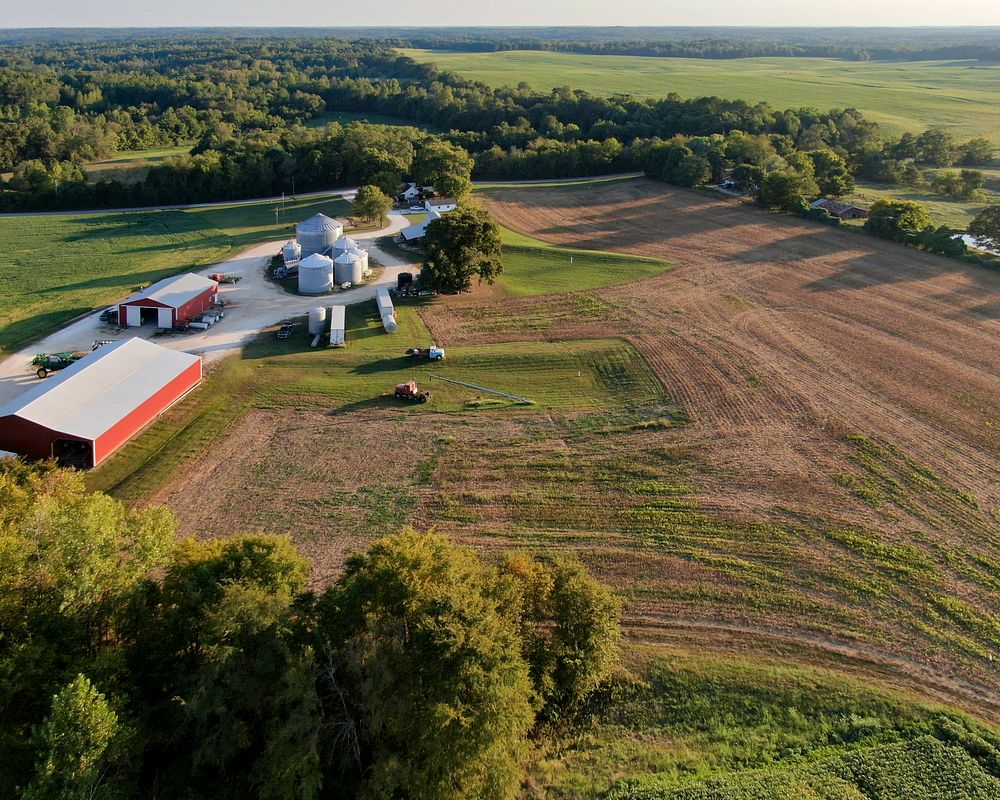
Aerial view of two man-made Water and Sediment Control Basins (practice code 638) at Norwood Farms where owners and producers Don and son Grant Norwood implement crop rotation and residue management to reduce erosion leading to improved land use and crop production; they practice no-till farming on nearly every acre in the operation, in Henry County, TN, on Sept 18, 2019.
U.S. Department of Agriculture (USDA) Farm Production and Conservation (FPAC) Natural Resources Conservation Service (NRCS) and Norwood Farm showcases the building blocks of conservation with conservation crop rotation on the entire Norwood operation. The crops are rotated between corn, wheat, soybeans and in some cases, corn cover crops and soybeans cover crops. The practices are implemented to reduced erosion sediment in surface water and are leading to improved land use and crop production.
Conservation Crop Rotation (Practice Code 328) is a management practices where growing a planned sequence of various crops takes place on the same piece of land for a variety of conservation purposes. Crops included in conservation crop rotation include high-residue producing crops such as corn or wheat in rotation with low-residue- producing crops such as soybeans. Crop rotations vary with soil type, crops produced, farming operations, and how the crop residue is managed. The most effective crops for soil improvement is fibrous-rooted high-residue producing crops such as grass and small grain.
Residue and Tillage Management (Practice Code 329) is managing the amount, orientation and distribution of crop and other plant residue on the soil surface throughout the year. For our area, we are utilizing reduced tillage and no-till. Residue and Tillage Management should be used on all cropland fields, especially where excess sheet and rill erosion are a problem. Residue and tillage management is most effective when used with other conservation practices like grassed waterways, contouring, field borders, etc.
NRCS has a proud history of supporting America’s farmers, ranchers, and forest landowners. For more than 80 years, we have helped people make investments in their operations and local communities to keep working lands working, boost rural economies, increase the competitiveness of American agriculture, and improve the quality of our air, water, soil, and habitat. As the USDA’s primary private lands conservation agency, we generate, manage, and share the data, technology, and standards that enable partners and policymakers to make decisions informed by objective, reliable science. And through one-on-one, personalized advice, we work voluntarily with producers and communities to find the best solutions to meet their unique conservation and business goals. By doing so, we help ensure the health of our natural resources and the long-term sustainability of American agriculture.
Farm Production and Conservation (FPAC) is the Department’s focal point for the nation’s farmers and ranchers and other stewards of private agricultural lands and non-industrial private forest lands. FPAC agencies implement programs designed to mitigate the significant risks of farming through crop insurance services, conservation programs, and technical assistance, and commodity, lending, and disaster programs.
The agencies and services supporting FPAC are Farm Service Agency (FSA), NRCS, and Risk Management Agency (RMA).
For more information please see www.usda.gov
USDA Photo by Lance Cheung. Original public domain image from Flickr